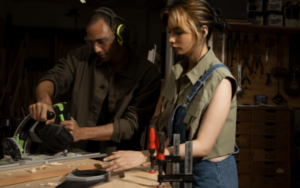Transitioning to Adulthood with Autism, not a linear proposition:
For our family, the journey has been about identifying developmental gaps and building independence step by step. Using a concept map, we’re revisiting missed milestones with the goal of helping our child gain back some resilience and confidence. I don’t think anyone could describe our experience as linear, and I think for many neurodivergent and/or autistic people, the transition to adulthood can be a significant challenge.
Rebuilding Independence: Using a Concept Map to Address Missed Skills in Adulthood:
Life often feels like a whirlwind, especially when recovery, parenting, and the chaos of everyday living collide. For our family, the path has been far from linear, if you have read any of this blog you get that life has been filled with unique challenges, many fails, and too few hard-won victories. Now, as my child is about to turn 21 and longs for the independence that adulthood promises, we are uncovering pieces of the puzzle that were missed along the way.
It’s not that we didn’t try, far from it. Every day was focused on survival, healing, and finding joy in the small wins. But in that beautiful chaos, some building blocks were left unattended. Now, as we stand at the precipice of adulthood, we are faced with the reality that there are gaps that will make independence more difficult than it should be. So, as we move onto the next phase we sat down and tried to figure out where the deficits were, and what we can do now to bridge those challenges.

Why Independence Is a Journey, Not a Destination
As I worked through the steps and stages, I ended up creating a concept map, a tool to help my child identify what he missed and revisit those crucial stages of development. I’m sharing it here because, well, why not? This map became a roadmap to empowerment, designed to help him understand what he needs to blend in, grow, and eventually become independent. The goal is to help him move forward with more confidence and, hopefully, resilience.
Adulthood is a puzzle built on skills, values, and experiences developed over a lifetime, but it’s not obvious when you’re 5 that the lessons you’re learning will serve you well at 25. The journey to independence is usually so carefully structured for most of us that it feels invisible. Stages of development seem to flow naturally, each skill builds on the last as we move through life, picking up problem-solving abilities, time management, social interactions, and conflict resolution along the way.
We crawl before we pull up, we pull up before we walk, and we walk before we run. Nobody has to explain the process; we simply figure it out. Most of what we need to thrive as adults is acquired through the natural flow of forced social interactions, at school, in church, youth groups, extracurricular activities like band or sports, and later on, in the workplace, through friendships, and even on dates.
But what if you’re not part of that mainstream flow? If you’re misunderstood or excluded, those critical skills and constructs can slip through the cracks. This isolation creates deficits, which in turn deepens the isolation, forming a vortex that can feel impossible to escape.
Mastery at each phase of development isn’t just important for survival; it’s essential for thriving in today’s complex world. Each stage builds toward adulthood’s expectations. And here’s the thing: adults just expect other adults to know these things, to intuitively understand how to navigate life. But for those who missed those foundational lessons, the path to independence can feel far more daunting.
Early Developmental Gaps We’re Revisiting
When we look back, it’s easy to see how life’s overwhelming demands caused some early building blocks to slip through the cracks. Skills like trust, communication, and basic self-care, often taken for granted by others, weren’t solidified in the way they should have been. Now, we’re re-focusing on some of those foundational skills. Working together to refine communication skills, emphasizing healthy boundaries, clarity, and understanding. Trust is about creating a safe, consistent environment where my almost adult feels safe to speak his truth but also being heard and supported. Small victories, like mastering a morning hygiene routine, managing a personal schedule, and even doing dishes and laundry, remind us that it’s never too late to learn.
Navigating Adolescence with a Fresh Perspective
You may remember middle school years were a sh*t-show, a period where chaos pulled us in stupid directions. Skills like time management, emotional regulation, and responsibility took a backseat to our more immediate concerns. As a result, tasks that should now be routine, like staying on top of commitments or managing emotions during conflict, are instead the source of confusion and misunderstandings. These skills need to be broken into manageable pieces to become rote. My child has to take ownership of daily tasks and long-term goals thereby prioritizing his emotional intelligence by practicing mindfulness and understanding emotions, for example, reframing “I am furious” when something goes wrong, to “You’re frustrated because you didn’t get your expected outcome, but there will be other opportunities, and that’s okay” we nurture self-awareness and emotional regulation. The more we practice these conflict resolution skills, the more I am seeing his confidence grow. So even though we missed dozens of opportunities to build resilience in our young adult with autism, we are learning to navigate those skills now.
Reclaiming the High School Years: Lessons Lost to COVID
We are still cursing COVID lockdowns. It did immeasurable damage to his mental health, his independence, his maturity, his confidence, his coping skills, and anything else you can think to throw in there. He was isolated, lonely, and alone, not one single person came to visit during those lockdowns, and there were no Zoom calls, phone calls, or people checking in. He was invisible at school, he became more invisible when he was forced to be home. Once school went back in, having lost access to his aides and IEP for over a year, he was just never able to regain what he lost. High school is supposed to be a time of preparation for independence, but for us, it was about survival. Now, we’re trying furiously to learn those critical lessons from that time: Job readiness, self-care, and complex decision-making. All of which were lost during COVID. He became a shell. If you have any autism coping strategies post-COVID, we are all ears. It was hard on everyone, but for some it really was devasting, my kid being one of them.
Now, my child is open to exploring part-time work opportunities, not just for income, but to build essential skills like punctuality, teamwork, and following instructions. We’ve had to focus on personal health, creating routines around meal planning, exercise, and mental well-being. Decision-making, once a source of anxiety, is now practiced in small, low-stakes scenarios to build confidence for the bigger choices ahead.
The Concept Map: A Tool for Empowerment
Creating a concept map wasn’t just about identifying what was missed, it was about creating a tool for empowerment. It’s a way to say, “Yes, we missed some things, but YOU can address them now.” Not me, not us, not “here let’s take over and show you”, it’s a visual reminder for HIM that learning and growth are lifelong processes, not confined to a particular stage of life. This is his concept map for independence. You can always learn more, or something new. He will be using the map to guide his steps and to check off what he missed, not as a checklist to rush through, but as a flexible plan tailored to his unique journey. Each skill can be strengthened and is a stepping stone toward independence. It’s not about perfection; it’s about progress. Navigating adolescence with autism is just always going to be harder it seems. Revisiting missed developmental milestones isn’t what anyone wants to hear, but it’s what we have to do.

What This Journey Has Taught Us
Grace and Patience Are Essential: For others and ourselves. It’s easy to feel regret for what was missed, but we’ve learned to extend grace to ourselves and each other. Life doesn’t follow a straight path, and that has to be okay for everyone.
Independence Is Built, Not Inherited: Independence doesn’t happen all at once; it’s the result of consistent effort and support.
It’s Never Too Late: No matter the stage of life, growth is always possible. Each step forward is a testament to resilience and the human capacity for change.
Step Away: We can step away and let him navigate difficult things. It is hard to watch the struggle, but the joy we see when he completes something he couldn’t do before is worth every second of the stress it took to get there.
Redefining the Timeline: Embracing Growth at Any Age
So we move forward as we always do. This journey might look similar to others but it is uniquely ours. It’s not about rushing to meet societal expectations of independence but about building the skills and confidence my child needs to live a fulfilling, self-reliant life. The concept map is just a visual reminder, a truth in that it’s never too late to go back, fill in the blanks, and move forward with purpose. Regardless of what you are facing. People do go to college at 60, people can choose to learn to drive at 29, and I have changed careers more times than I can even mention. The point being, that we as humans, can always learn new things.
Life often feels like a whirlwind, especially when recovery, parenting, and the demands of everyday living collide. For our family, the path has been far from linear, filled with unique challenges and hard-won victories. Now, as my child is almost legally an adult and longs for the independence that adulthood promises, we are uncovering more and more pieces of the puzzle that were missed along the way.
When B was diagnosed, we were told there was a finite “window of opportunity” to help him reach his potential. And we believed it and went into overdrive because as parents, we want to do whatever it takes for our children. But looking back, it’s clear that this was more than just flawed advice; it was part of an industrial complex built off the backs of kids with disabilities. An industry that markets hope to families while reinforcing the insidious belief that our kids will never make it on their own. The truth? There is no “window of opportunity” and it doesn’t close. Life is dynamic, and progress isn’t confined to a specific timeline. Each day brings new opportunities to learn, grow, and celebrate. So on we go. Our next chapter is being written.
Download the Free Concept Map for Your Journey
If you feel it will help you and your family. I wish I had understood this years before I did. I wish I could have fast-forwarded to now and then gone back to do it the right way. I will never have that chance, but if you are just starting out, you do. You have the chance to connect with others who have gone ahead, I urge you to pay attention to their stories, it may give you a roadmap to rewrite yours before you find yourself where we are now. Download the free concept map we created to help identify and address missed developmental milestones. Empower your young adult with the skills they need for independence.
Skills roadmap for independence Download:
